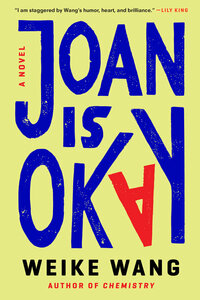You need to sign in or sign up before continuing.
Take a photo of a barcode or cover
reflective
sad
slow-paced
Plot or Character Driven:
Character
Strong character development:
No
Loveable characters:
No
Diverse cast of characters:
Yes
Flaws of characters a main focus:
Complicated
Summary
Joan is a doctor.
Joan is the accidental second child of emotionally distant immegrant parents who moved back to China as soon as she started college.
Joan's home is the hospital ... until her father dies and the hospital tells her she hasn't taken enough time to grieve.
My Thoughts
The positives. This was a unique book, and I appreciated the opportunity it lent to look at life through someone else's eyes. There was a certain, soulful quality to the narration despite it being difficult to follow at times.
The negatives. There was no real plot and the book was ... well, unique (see above). Unique down to the choice to skip quotation marks for dialogue. The narrator is so disconnected from her own emotions that it is hard, as the reader, to fully understand or immerse into book.
Content
No romantic, violent, or religious content. There is infrequent swearing, almost all of which is f-bombs.
Joan is a doctor.
Joan is the accidental second child of emotionally distant immegrant parents who moved back to China as soon as she started college.
Joan's home is the hospital ... until her father dies and the hospital tells her she hasn't taken enough time to grieve.
My Thoughts
The positives. This was a unique book, and I appreciated the opportunity it lent to look at life through someone else's eyes. There was a certain, soulful quality to the narration despite it being difficult to follow at times.
The negatives. There was no real plot and the book was ... well, unique (see above). Unique down to the choice to skip quotation marks for dialogue. The narrator is so disconnected from her own emotions that it is hard, as the reader, to fully understand or immerse into book.
Content
No romantic, violent, or religious content. There is infrequent swearing, almost all of which is f-bombs.
Moderate: Pandemic/Epidemic
Minor: Xenophobia, Grief
emotional
inspiring
reflective
medium-paced
Plot or Character Driven:
A mix
Strong character development:
Complicated
Loveable characters:
Complicated
Diverse cast of characters:
Yes
Flaws of characters a main focus:
No
reflective
slow-paced
Plot or Character Driven:
Character
Strong character development:
No
Loveable characters:
No
Diverse cast of characters:
Complicated
Flaws of characters a main focus:
Complicated
funny
informative
medium-paced
emotional
funny
hopeful
reflective
sad
medium-paced
Plot or Character Driven:
Character
Strong character development:
No
Loveable characters:
Yes
Diverse cast of characters:
Yes
Flaws of characters a main focus:
Complicated
reflective
slow-paced
Plot or Character Driven:
Character
Strong character development:
No
Loveable characters:
No
Diverse cast of characters:
Yes
Flaws of characters a main focus:
Complicated
I felt like this book was really slow. Then it got a little interesting discussing the immigrant and Chinese American experience. But the backdrop of the beginning of the pandemic paired with the lack of interesting plot killed it for me. I felt anxiety reading about Covid cases going up after just living the experience.
emotional
reflective
slow-paced
Plot or Character Driven:
Character
Strong character development:
Yes
Loveable characters:
Complicated
Diverse cast of characters:
Yes
Flaws of characters a main focus:
Complicated
There are no quote marks and that took some time to get used to. Because of the lack of quote marks, I saw this as Joan inside her head the whole time and this is how she was interpreting what was happening. That made it easier for me to finish.
Not my usual kind of book but I’m glad I read it.
Not my usual kind of book but I’m glad I read it.
challenging
emotional
reflective
medium-paced
I'm really fascinated/fatigued by how fictional media has begun to address covid. So often, it's falsely narrativized as a moment when everyone steps up to become their best selves, as if it was "worth it" because we collectively learned something.
The reality is that any sort of traumatic event resists narrative simplifications, and sometimes the lesson is that there is no lesson. It was just a bad thing that had to be suffered.
"Joan is Okay" expertly navigates the issue by placing the pandemic unceremoniously toward the end of the book, not as the culmination of the plot, but a disruption. It's not the catalyst for the protagonist's self-actualization, and her clinical detachment might shock readers. Nevertheless, it makes sense—she is still processing the death of her father, which is noted in the opening pages but quickly takes a backseat to the plot as Joan avoids dealing with her grief (or lack thereof).
Ultimately, this story feels realistic. We are creatures that barely have the capacity for our own pain, and we cannot share in the pain of others until we have learned to carry our own.
Does Joan learn?
That's a question that each reader will have to answer for themselves.
I'll be curious to revisit this several years down the road, but for now, it feels like Weike Wang has tapped into something that evades many other writers—the idea that life often happens in the spaces surrounding dramatic events more than in the events themselves.
The reality is that any sort of traumatic event resists narrative simplifications, and sometimes the lesson is that there is no lesson. It was just a bad thing that had to be suffered.
"Joan is Okay" expertly navigates the issue by placing the pandemic unceremoniously toward the end of the book, not as the culmination of the plot, but a disruption. It's not the catalyst for the protagonist's self-actualization, and her clinical detachment might shock readers. Nevertheless, it makes sense—she is still processing the death of her father, which is noted in the opening pages but quickly takes a backseat to the plot as Joan avoids dealing with her grief (or lack thereof).
Ultimately, this story feels realistic. We are creatures that barely have the capacity for our own pain, and we cannot share in the pain of others until we have learned to carry our own.
Does Joan learn?
That's a question that each reader will have to answer for themselves.
I'll be curious to revisit this several years down the road, but for now, it feels like Weike Wang has tapped into something that evades many other writers—the idea that life often happens in the spaces surrounding dramatic events more than in the events themselves.
This is an extraordinary book. It’s quiet and it’s brilliant and you are rooting so hard for Joan. And the Seinfeld reference was truly excellent.





